
In the hearts of those who love his music, Portland Town, an emblematic anti-war protest song, will forever be associated with Derroll Adams. For several decades, he sang this song – of which the first line is a proud evocation of his origins – on folk music stages across Europe. It illustrates the man’s deep affection for his roots and for his family’s past, even though he left the U.S.A., rejecting its social model, to spend most of his life on European soil, primarily in Belgium where he eventually settled and made his home. His childhood may not have been an example of tranquillity, but Derroll still liked to talk about growing up in what turned out to be the end of the somewhat mythical Wild West.

Derroll Lewis Thompson was born in Portland, Oregon, on November 27, 1925. His father, Ernest Raymond “Tom” Thompson, was first a juggler and then a tombstone polisher. His mother, Elizabeth Gertrude Kerr, was of Scottish descent: her ancestors were pioneers who travelled the famous Oregon Trail in covered wagons from Arkansas to settle down in the new Northwest Territories. This ancestry is the source of Derroll Adams’s first name: a souvenir of a fictional Scottish hero (Captain Derroll). However, Derroll’s family soon preferred to call him by his nickname, “Buddy”. Elizabeth left her husband who had become an alcoholic. After he died, she re-married Jack Glenn. 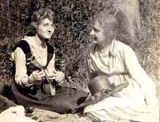 But the man was rough and brutal to Derroll, and so the couple split. In 1930, Elizabeth and her son moved into an apartment house in Portland. One of the tenants there,
But the man was rough and brutal to Derroll, and so the couple split. In 1930, Elizabeth and her son moved into an apartment house in Portland. One of the tenants there,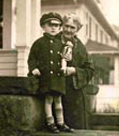 George Irwin Adams, came to assume the role of Derroll’s missing father. He was a good and generous man – “a true old western gentleman”, as Derroll often repeated – and whose name he later assumed. His grandfather, “Grandpa Adams”, had fought the Indians and had known Wild Bill Hickock personally. One day, young Derroll asked him if he too had a six gun. Grandpa Adams’s only answer was to half-open the tails of the greatcoat he always wore, allowing Derroll a glimpse of the sawed-off shotgun that was strapped to his leg. Derroll’s Aunt Netty, a former saloon dancer, used to live with one of Kit Carson’s companions and saw the man get shot dead in a duel right in the middle of the street. Derroll could spend literally hours telling such stories.
George Irwin Adams, came to assume the role of Derroll’s missing father. He was a good and generous man – “a true old western gentleman”, as Derroll often repeated – and whose name he later assumed. His grandfather, “Grandpa Adams”, had fought the Indians and had known Wild Bill Hickock personally. One day, young Derroll asked him if he too had a six gun. Grandpa Adams’s only answer was to half-open the tails of the greatcoat he always wore, allowing Derroll a glimpse of the sawed-off shotgun that was strapped to his leg. Derroll’s Aunt Netty, a former saloon dancer, used to live with one of Kit Carson’s companions and saw the man get shot dead in a duel right in the middle of the street. Derroll could spend literally hours telling such stories.
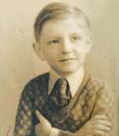
However, his youth was not all folklore and idleness; the boy quickly learned about endless journeys on America’s roads against the backdrop of the Great Depression’s darkest years. George, Elizabeth and he were forever having to move from town to town throughout the Northwest. Wherever he landed, Derroll immediately tried to strike up friendships, only to be forced to move again soon. These constant upheavals, as well as his nomadic and hectic existence, affected him deeply. Derroll often said that his only true home was the back seat of his parents’ old Chevy. Cuddled up in this shelter, he would listen to his favourite hillbilly and country western music on the radio; especially the broadcasts of the popular “Grand Ole Opry”. In this way he discovered with wonder Jimmy Rodgers, the Carter Family, Uncle Dave Macon, Clarence Ashley, Rachel and Oswald, Lulu Belle and Scotty, Stringbean and others. More importantly, he heard for the very first time the tinkling sounds of the five-string banjo–even though he had no clue at the time as to what this weird instrument might actually look like. He played the harmonica and invented tunes inspired by the plaintive and harrowing whistle of steam trains. Show business was another wonder to him: he liked to imitate Maurice Chevalier and mimic Buck Jones, his favourite western movie hero, and Lefty Carson, the singing cowboy. His parents also worked regularly as seasonal labourers on large farms. There, he was moved by Negro and gospel music. Much later, he worked as a windfall bucker in the vast north western forests of Oregon and Washington. He loved these huge expanses more than anything else for their untouched nature and the simple but tough life of the Indians he came across. These memories he always cherished, and so many of them shaped his philosophy of life.
he heard for the very first time the tinkling sounds of the five-string banjo–even though he had no clue at the time as to what this weird instrument might actually look like. He played the harmonica and invented tunes inspired by the plaintive and harrowing whistle of steam trains. Show business was another wonder to him: he liked to imitate Maurice Chevalier and mimic Buck Jones, his favourite western movie hero, and Lefty Carson, the singing cowboy. His parents also worked regularly as seasonal labourers on large farms. There, he was moved by Negro and gospel music. Much later, he worked as a windfall bucker in the vast north western forests of Oregon and Washington. He loved these huge expanses more than anything else for their untouched nature and the simple but tough life of the Indians he came across. These memories he always cherished, and so many of them shaped his philosophy of life.
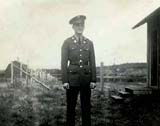
Derroll was 16 at the time of the attack on Pearl Harbor – December 7, 1941. Full of idealism, he lied about his age to join the Army. He was eventually drafted by the Navy, where he trained as a combat diver. The on-going stress and brutality of the training, as well as the cruelty of the man around him, affected and destabilized him seriously. But this trying experience also provided him with an opportunity to learn more about the five-string banjo, an instrument that many of his comrades in arms from the South were quite familiar with. They gave him a chance to hear some good banjo pickers first hand. Back in Portland after having been discharged for suffering from psycho-neurosis anxiety, he studied at Reed College’s Museum Art School on a scholarship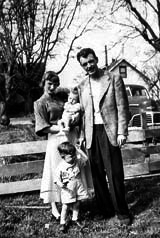 from 1945 to 1950. Two major events left a mark on his twentieth birthday: the birth of Scott, his first child, mothered by his high school sweetheart, Adeline, whom he had married in 1943, and a gift from his mother: a five-string banjo. Derroll immediately gave up on the guitar and mandolin, which he had been practising half-heartedly, and started playing the banjo, without knowing exactly how to tune it at first. A year later, he left Adeline for Lorene, with whom he had two children: Mark and Deborah. It was during this time in his life that he gathered a lot of folksongs and country music, listening to Bascom Lamar Lundsford, Buell Kazee, Dock Boggs, Burl Ives, Roy Accuf, Cousin Emmy, Woody Guthrie, Lead Belly and Josh White, Jr. He also discovered yoga and Zen Buddhism at this time. On the political level he adhered to Senator Henry Wallace’s movement, the Progressive Party. During a hootenany at Portland Community Center (hoot was the term used in those days), he met Pete Seeger. At the end of the concert, Pete showed him – at last – how to properly tune a five-string banjo, which came as a revelation to this dedicated student. Making tremendous musical progress, he took an increasingly active part in Wallace’s movement and even played at political gatherings. However, he was soon disgusted by some of the leaders’ opportunism and turned to other, more sincere, militants such as Jim Garland and his sister, Aunt Molly Jackson, politically committed musicians who were quite famous at the time.
from 1945 to 1950. Two major events left a mark on his twentieth birthday: the birth of Scott, his first child, mothered by his high school sweetheart, Adeline, whom he had married in 1943, and a gift from his mother: a five-string banjo. Derroll immediately gave up on the guitar and mandolin, which he had been practising half-heartedly, and started playing the banjo, without knowing exactly how to tune it at first. A year later, he left Adeline for Lorene, with whom he had two children: Mark and Deborah. It was during this time in his life that he gathered a lot of folksongs and country music, listening to Bascom Lamar Lundsford, Buell Kazee, Dock Boggs, Burl Ives, Roy Accuf, Cousin Emmy, Woody Guthrie, Lead Belly and Josh White, Jr. He also discovered yoga and Zen Buddhism at this time. On the political level he adhered to Senator Henry Wallace’s movement, the Progressive Party. During a hootenany at Portland Community Center (hoot was the term used in those days), he met Pete Seeger. At the end of the concert, Pete showed him – at last – how to properly tune a five-string banjo, which came as a revelation to this dedicated student. Making tremendous musical progress, he took an increasingly active part in Wallace’s movement and even played at political gatherings. However, he was soon disgusted by some of the leaders’ opportunism and turned to other, more sincere, militants such as Jim Garland and his sister, Aunt Molly Jackson, politically committed musicians who were quite famous at the time.

Having completed his studies in 1950, he took a number of small jobs: radio-announcer, taxi-driver, window-dresser, etc. He also broke up with Lorene to live with Elizabeth, a painter he had met at the Museum Art School. They decided to leave for Mexico, but along the way they settled down in San Diego, California. Then they moved up to Oceanside, and this is where their son Gregorio was born. They stayed there for a while, living in a trailer, before moving to Los Angeles. To make ends meet, Derroll found various jobs again, such as driving trucks for Max Factor.
During the year 1953, the loss of his first children and his meeting with an old couple who had lost their only child in Korea inspired him to compose Portland Town, a poignant protest song. But mccarthyism had become deeply-rooted in American social life and it was not recommended to advertise such thoughts at the time. Later, singer Barbara Dane popularised the song in the U.S.A. and other American artists recorded it, including Joan Baez, The Kingston Trio, Josh White, Jr., Bob Harter and Dick Weissman. In Europe, Alex Campbell, Colin Wilkie and Shirley Hart, Finbar Furey, Long John Baldry, Van Morrison, Marianne Faithfull, Kirsten & Bernd (The Balladeers) and others did the same.
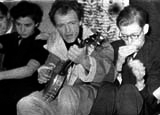
While he was working for Max Factor, one of his colleagues, Sid Berman, noticed Derroll’s musical ability and introduced him to a band of young musicians from Los Angeles who formed The World Folk Artists: Frank Hamilton, Weston Gavin, Odetta, Jo Mapes, Guy Carawan, Marcia Berman, Ed Pearl, etc. On one summer night, in the year 1954, Sid took him to Topanga Canyon, to the herb farm of Will Geer - a fashionable actor (the colourful old trapper in the movie “Jeremiah Johnson”) who lived with his wife Herta on the fringe of society because of political affiliations slightly to the left of the left. With his own hands Will had built a Greek theatre and around him had gathered a community of various artists, movie and theatre actors from the Hollywood scene, poets, musicians and entertainers, many of them sharing the widely held ideas of Jack Kerouac and Allen Ginsberg, the gurus of the Beat Generation. Derroll was introduced to a talented guitar player and singer from New York, with the looks of a cowboy, a certain Jack Elliott, and people urged them to play something together. They agreed on Jimmy Rodgers’s Muleskinner Blues, but Derroll did not have his banjo with him. Never mind! Bess Lomax-Hawes (folklorist Alan Lomax’s sister) gave him hers. That night, Derroll Adams and Jack Elliott gave an outstanding performance which brought down the house. This was the beginning of a long friendship and of a peerless duo. Topanga residents also included Woody Guthrie, Cisco Houston. Derroll and Jack played in bars, clubs and on some West Coast campuses. In Los Angeles they also made new acquaintances such as James Dean and Krishnamurti.

1955: Derroll contributed to Elmer Bernstein’s original soundtrack for “Drango” – the story of Major Clint Drango – a western movie directed by Hal Barlett and Jules Bricken (released in 1957, starring Jeff Chandler as Major Clint Drango). In the meantime, Jack married June Hammerstein, a young actress. Derroll was the best man at their wedding and played a frenzied Rich and Rambling Boy, changing the lyrics slightly for the occasion. June’s mind was set on one dream - of going to Europe. She convinced Jack to follow her to London and he played in the streets and in pubs there. With “Ramblin'” Jack Elliott, London’s youth discovered the most genuine representative of American folk music and the songs of Woody Guthrie, Jimmy Rodgers, Lead Belly, Jesse Fuller, Roy Accuf and Hank Williams,
 as well as traditional cowboy songs. Around the same time, London was awash with the skiffle craze popularised by the Kingston Trio, Lonnie Donnegan and Johnny Duncan. Jack Elliott’s success was instantaneous. But he missed his friend Derroll. Derroll left Elizabeth and their two children, Gregorio and Tamara. Invited by Jack and June, and despite being broke, Derroll arrived in Southampton on February 14th, 1957. The three friends lived in Lambeth North, in a hovel called The Yellow Door. Derroll and Jack played in the streets and in Soho pubs and coffee bars (June passing the hat) as well as in fashionable night clubs. Derroll’s baritone contrasted wonderfully with Jack’s near-countertenor nasal voice and the mix
as well as traditional cowboy songs. Around the same time, London was awash with the skiffle craze popularised by the Kingston Trio, Lonnie Donnegan and Johnny Duncan. Jack Elliott’s success was instantaneous. But he missed his friend Derroll. Derroll left Elizabeth and their two children, Gregorio and Tamara. Invited by Jack and June, and despite being broke, Derroll arrived in Southampton on February 14th, 1957. The three friends lived in Lambeth North, in a hovel called The Yellow Door. Derroll and Jack played in the streets and in Soho pubs and coffee bars (June passing the hat) as well as in fashionable night clubs. Derroll’s baritone contrasted wonderfully with Jack’s near-countertenor nasal voice and the mix
 of banjo and guitar was a great success. They namely performed under the name of The Cowboys in Alexis Korner’s club The Roundhouse, The Cousin’s and in The Blue Angel. As The Ramblin’ Boys, they also recorded their first album with a local label, Topic. At the end of that contract, Jack, June and Derroll decided to tour the continent. They went to France, then to Italy where Derroll and Jack recorded two more LP’s. During a stay in Paris, Derroll met Alex Campbell
of banjo and guitar was a great success. They namely performed under the name of The Cowboys in Alexis Korner’s club The Roundhouse, The Cousin’s and in The Blue Angel. As The Ramblin’ Boys, they also recorded their first album with a local label, Topic. At the end of that contract, Jack, June and Derroll decided to tour the continent. They went to France, then to Italy where Derroll and Jack recorded two more LP’s. During a stay in Paris, Derroll met Alex Campbell
 who became a great friend. The two busked in Saint-Germain-des-Prés, eventually being engaged by Arlette Reinerg and Mel Howard, the future renowned American producer, to perform at the Café Contrescarpe. Derroll also fell in love with Isabelle, a distinguished decorator who worked for Christian Dior. They settled in Brussels, married in June of 1958, and became associates in a free-lance, fashion-shop window-dressing business. This union gave birth to Vincent and Catherine.
who became a great friend. The two busked in Saint-Germain-des-Prés, eventually being engaged by Arlette Reinerg and Mel Howard, the future renowned American producer, to perform at the Café Contrescarpe. Derroll also fell in love with Isabelle, a distinguished decorator who worked for Christian Dior. They settled in Brussels, married in June of 1958, and became associates in a free-lance, fashion-shop window-dressing business. This union gave birth to Vincent and Catherine.
 During the same year of 1958, Derroll and Jack, now known as The Cowboys, performed in the American Pavilion at the Brussels World Fair. The next year, Jack and June eventually parted ways, which marked the end of the trio’s adventures. Jack Elliott returned to the U.S.A. where he was soon labelled as “the spiritual son of Woody Guthrie and spiritual father to Bob Dylan” and became a prominent figure of America’s cultural heritage.
During the same year of 1958, Derroll and Jack, now known as The Cowboys, performed in the American Pavilion at the Brussels World Fair. The next year, Jack and June eventually parted ways, which marked the end of the trio’s adventures. Jack Elliott returned to the U.S.A. where he was soon labelled as “the spiritual son of Woody Guthrie and spiritual father to Bob Dylan” and became a prominent figure of America’s cultural heritage.
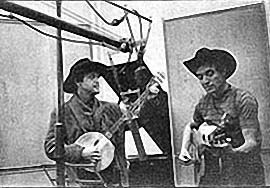
|
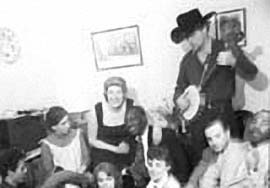
|

|
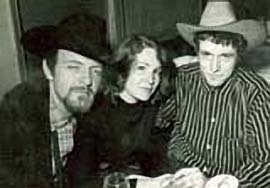
|

|

|
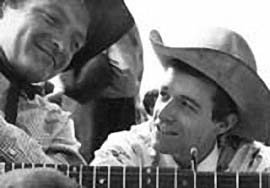
|
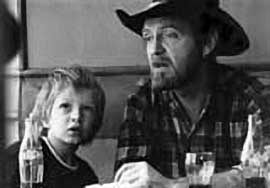
|

Derroll played on the streets and in pubs only occasionally after Jack’s departure. He lived near the Grand-Place of Brussels and was a regular at the  Welkom, the favourite café among “Bohemians” (as they were called back then) and other assorted Beatniks. Many were impressed by this tall picturesque and unique figure: stringed jacket, threadbare blue jeans, worn out cowboy boots, Stetson and banjo – an original sight in our land indeed! His songs must have sounded quite original to most listeners too, but it was mostly the man’s brilliant personality, charisma and reassuring coolness that people noticed when they first met him. His deep, warm voice told the songs more than it sang them. His banjo style was most delicate and superbly clean (listen to his masterful rendition of Pretty Little Miss).
Welkom, the favourite café among “Bohemians” (as they were called back then) and other assorted Beatniks. Many were impressed by this tall picturesque and unique figure: stringed jacket, threadbare blue jeans, worn out cowboy boots, Stetson and banjo – an original sight in our land indeed! His songs must have sounded quite original to most listeners too, but it was mostly the man’s brilliant personality, charisma and reassuring coolness that people noticed when they first met him. His deep, warm voice told the songs more than it sang them. His banjo style was most delicate and superbly clean (listen to his masterful rendition of Pretty Little Miss).  The man was a born-entertainer who could capture the most varied of audiences – even those with no inclination for the American idiom – with his infectious cheerfulness that was a subtle mix of humanity, tenderness plus a good pinch of humour. The icing on the cake was his kindness and a matchless touch of class. He was also, simply,
The man was a born-entertainer who could capture the most varied of audiences – even those with no inclination for the American idiom – with his infectious cheerfulness that was a subtle mix of humanity, tenderness plus a good pinch of humour. The icing on the cake was his kindness and a matchless touch of class. He was also, simply,  a poet: songs such as The Sky, The Mountain, The Valley and Love Song provide ample proof of his enormous talent. The – apparent – simplicity of his banjo style amplifies the clarity of his lyrics. This combination enabled him to go directly to the heart of the matter with seemingly very little effort, hitting home most of the time. And that is what makes him timeless.
a poet: songs such as The Sky, The Mountain, The Valley and Love Song provide ample proof of his enormous talent. The – apparent – simplicity of his banjo style amplifies the clarity of his lyrics. This combination enabled him to go directly to the heart of the matter with seemingly very little effort, hitting home most of the time. And that is what makes him timeless.

He was in London in 1965 when he met Paul Simon and also Donovan who he took him under his wing. He appeared briefly in “Dont Look Back”, a documentary shot by American moviemaker Donn Alan Pennebaker during Bob Dylan’s first UK tour. In this film, he is seen introducing a young Donovan to Dylan. For Donovan, Derroll Adams was a true master. Later he dedicated his most colourful and enchanting song to
 him. Epistle to Derroll is a token of his affection and admiration for “the banjoman with the tattoos on his hands”. Still, let there be no illusion, every rose has its thorns and so Derroll fell prey to alcohol and had several close encounters with death. He ended up divorcing and losing his children, once again. During the year 1967, still in London, Derroll recorded the wonderful LP Portland Town, greatly accompanied by Jack Elliott and Alex Campbell.
him. Epistle to Derroll is a token of his affection and admiration for “the banjoman with the tattoos on his hands”. Still, let there be no illusion, every rose has its thorns and so Derroll fell prey to alcohol and had several close encounters with death. He ended up divorcing and losing his children, once again. During the year 1967, still in London, Derroll recorded the wonderful LP Portland Town, greatly accompanied by Jack Elliott and Alex Campbell.

In 1970, Derroll Adams married Danny Levy, his last and thoughtful partner. Rebecca was born three years later. The couple settled down in Antwerp. Until the end of the 80s, he gave countless concerts, both in small, intimate folk clubs and in
 prestigious concert halls in Belgium and many other European countries including England, Ireland, France, Holland, Germany, Switzerland and Denmark. He recorded several more LP’s and his reputation grew steadily – maybe not among the general public (Derroll always walked the byways, far from the trappings of fame and media attention) but certainly with many professionals, for whom he became a model, or at least a first-class reference: Ian Anderson, Dave Arthur, Long John Baldry, Anne Briggs, Derek Brimstone, Vashti Bunyan, Martin Carthy, Billy Connolly, Barbara Dane, Julian Dawson, Dave Evans, Finbar Furey, Dick Gaughan, Davey Graham, Arlo Guthrie, Frank Hamilton, Shirley Hart, Maggie Holland, Paco Ibanez, Andy Irvine, Bert Jansch, Wizz Jones, Dr. John, Ron Kavana, Ronnie Lane (The Small Faces), Joe Locker, Iain MacKintosh, Youra Marcus, Jo Mapes, Ralph McTell, Odetta, John Renbourn, Jacqui McShee, Chris Simpson, Rod Stewart, Allan Taylor, Hans Theessink, Danny Thompson, Happy and Artie Traum, Roland Van Campenhout, Wannes Van De Velde, Hannes Wader, Colin Wilkie, Tucker Zimmerman, etc. Like Donovan, several of his friends wrote a song for or about him, and they are all beautifully crafted:
prestigious concert halls in Belgium and many other European countries including England, Ireland, France, Holland, Germany, Switzerland and Denmark. He recorded several more LP’s and his reputation grew steadily – maybe not among the general public (Derroll always walked the byways, far from the trappings of fame and media attention) but certainly with many professionals, for whom he became a model, or at least a first-class reference: Ian Anderson, Dave Arthur, Long John Baldry, Anne Briggs, Derek Brimstone, Vashti Bunyan, Martin Carthy, Billy Connolly, Barbara Dane, Julian Dawson, Dave Evans, Finbar Furey, Dick Gaughan, Davey Graham, Arlo Guthrie, Frank Hamilton, Shirley Hart, Maggie Holland, Paco Ibanez, Andy Irvine, Bert Jansch, Wizz Jones, Dr. John, Ron Kavana, Ronnie Lane (The Small Faces), Joe Locker, Iain MacKintosh, Youra Marcus, Jo Mapes, Ralph McTell, Odetta, John Renbourn, Jacqui McShee, Chris Simpson, Rod Stewart, Allan Taylor, Hans Theessink, Danny Thompson, Happy and Artie Traum, Roland Van Campenhout, Wannes Van De Velde, Hannes Wader, Colin Wilkie, Tucker Zimmerman, etc. Like Donovan, several of his friends wrote a song for or about him, and they are all beautifully crafted:
Donovan: Epistle to Derroll
Alex Campbell: The Banjo Man
Wizz Jones: The Man with the Banjo
Finbar Furey: Derroll in the Rain
Allan Taylor: Banjoman
Tucker Zimmerman: Oregon & Goodbye Derroll, Goodbye Friend
RalphMcTell: A Feather Fell
Chris Simpson (Magna Carta): The Banjoman
Frank Hamilton: Goodbye Derroll
Ron Kavana: The Last of the Troubadours

|
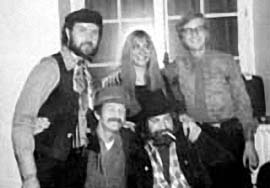
|

|
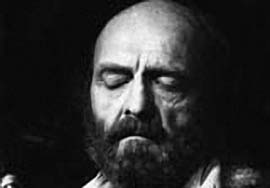
|

In 1972 Derroll played at the Cambridge Folk Festival and in 1976 Donovan persuaded Derroll to accompany
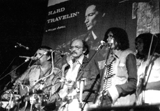 him on a U.S. tour. They were applauded at the Bottom Line in New York and at Roxy in L.A. It would be the last time Derroll would see America.The same year Derroll joined the Tønder Folk Festival in Denmark for the first time, where “Hard Travelling”, the concert of the year was a tribute to Woody Guthrie with Tom Paley, Alex Campbell, Robin McKidd and Davie Graig (High Speed Grass). In 1978, he attended another Woody Guthrie tribute in the Stadium of Ivry (near Paris, France), and in 1981 he performed at the Olympia in Paris (holding part one of Doc and Merle Watson’s concert).
him on a U.S. tour. They were applauded at the Bottom Line in New York and at Roxy in L.A. It would be the last time Derroll would see America.The same year Derroll joined the Tønder Folk Festival in Denmark for the first time, where “Hard Travelling”, the concert of the year was a tribute to Woody Guthrie with Tom Paley, Alex Campbell, Robin McKidd and Davie Graig (High Speed Grass). In 1978, he attended another Woody Guthrie tribute in the Stadium of Ivry (near Paris, France), and in 1981 he performed at the Olympia in Paris (holding part one of Doc and Merle Watson’s concert).
In 1984 Derroll returned to the Tønder Folk Festival for a major Woody Guthrie tribute, at which time he read some of Woody’s lyrics and introduced a glittering array of fellow artists, among them Odetta, Geraint Watkins, Joe Locker, Hans Theessink, Mike Whellans, Gary Richard,
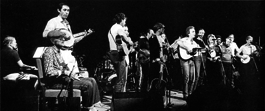 Allan Taylor, Hannes Wader, Holly Near, Andy Irvine, Hamish Imlach, Tom Luke, Ian MacKintosh, Davis Craig, Kieran O’Connor,
Allan Taylor, Hannes Wader, Holly Near, Andy Irvine, Hamish Imlach, Tom Luke, Ian MacKintosh, Davis Craig, Kieran O’Connor,
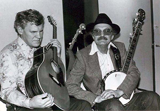 Robin McKidd and Arthur Kitchener.
Robin McKidd and Arthur Kitchener.
1987: The Tønder Folk Festival paid a tribute to one of its beloved friends, Alex Campbell, who died in January. Of course, Derroll was there, atending the “So Long Alex” concert, along with Patsy Campbell, Erling Overgaard, Niels Hausgaard, Rod Sinclair, Iain MacKintosh & Hamish Imlach.
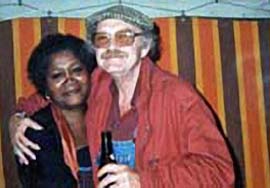
|
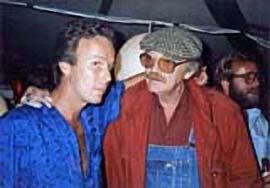
|
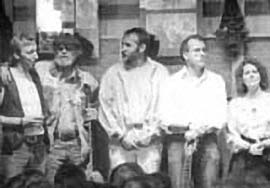
|
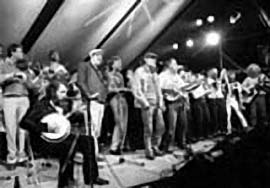
|
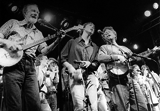
In 1990 Derroll met again with his old companion Pete Seeger at the Tønder Folk Festival, along
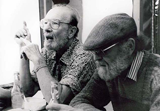 with Tao Rodriguez (Pete’s grandson), Arlo Guthrie, Allan Taylor, Eric Weissberg and many others.
In October “Ramblin'” Jack Elliott made it his duty to be present in Kortrijk, Belgium, for a magnificent tribute concert organised secretly by Derroll’s old-time friends on the occasion of his 65th birthday. Derroll and Jack toured Europe together one more time in the Summer of 1991, in Belgium, Holland and Germany (with Roland Van Campenhout, Youra Marcus and Tucker Zimmerman). From then on Derroll’s public appearances became scarce.
with Tao Rodriguez (Pete’s grandson), Arlo Guthrie, Allan Taylor, Eric Weissberg and many others.
In October “Ramblin'” Jack Elliott made it his duty to be present in Kortrijk, Belgium, for a magnificent tribute concert organised secretly by Derroll’s old-time friends on the occasion of his 65th birthday. Derroll and Jack toured Europe together one more time in the Summer of 1991, in Belgium, Holland and Germany (with Roland Van Campenhout, Youra Marcus and Tucker Zimmerman). From then on Derroll’s public appearances became scarce.
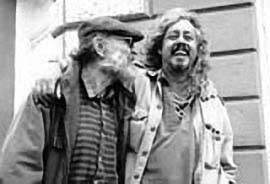
|
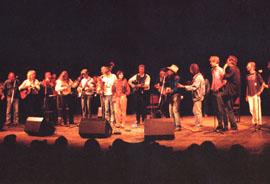
|
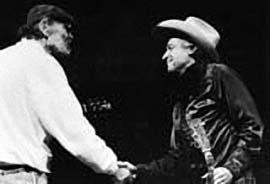
|
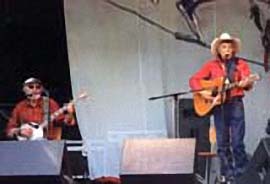
|
When failing health kept him and his most faithful companion – his banjo – away from the stage, Derroll Adams went back to painting. He was not just
 one of the many painters of his time. Keeping his distance from any form of academicism, he produced original, surprising and thought-provoking pictorial work. He was a genuine creator through and through, forever in a creative frame of mind, tortured in the prison of his own failing body. “Free your mind" was written on the door to his studio. He drew, wrote poetry and lyrics, composed melodies, fooled around with his banjo, enjoyed classical music, but also listened with enthusiasm to various kinds of new musical styles and sounds. He returned to his old passions
one of the many painters of his time. Keeping his distance from any form of academicism, he produced original, surprising and thought-provoking pictorial work. He was a genuine creator through and through, forever in a creative frame of mind, tortured in the prison of his own failing body. “Free your mind" was written on the door to his studio. He drew, wrote poetry and lyrics, composed melodies, fooled around with his banjo, enjoyed classical music, but also listened with enthusiasm to various kinds of new musical styles and sounds. He returned to his old passions
 with renewed energy: history, philosophy, esotericism, tarot, cabala and I Ching, as well as Chinese and Japanese music. With its meaningful silences, the latter ended up playing a fundamental role in his poetic inspiration and his banjo style which he wanted to be at one with his Zen principles. On one of his banjo skin he inscribed, in Chinese calligraphy, a Zen thought that sums him up wonderfully: “All the ways to laugh. And the last laugh is at yourself, but with compassion and love”.
with renewed energy: history, philosophy, esotericism, tarot, cabala and I Ching, as well as Chinese and Japanese music. With its meaningful silences, the latter ended up playing a fundamental role in his poetic inspiration and his banjo style which he wanted to be at one with his Zen principles. On one of his banjo skin he inscribed, in Chinese calligraphy, a Zen thought that sums him up wonderfully: “All the ways to laugh. And the last laugh is at yourself, but with compassion and love”.
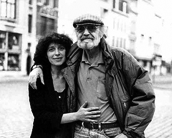
Having become a living legend in the hearts of many, “the folk singer of folk singers” received many visitors at the Antwerp retreat he shared with Danny and Rebecca. Some of them came to seek the advice of a much-esteemed master. The respect he enjoyed was a source of both surprise and delight to him. Derroll Adams, who turned folksong into a way of living, considered himself an entertainer more than a musician. One day, in Ireland, patriarch Ted Furey, Finbar’s father, told him: “you’re a real shannachie” (bard).
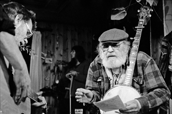 Derroll considered this to be the most beautiful thing ever said about him. He travelled a few more times to the Tønder Festival – at which he remained a distinguished guest – and, at the invitation of Arlo Guthrie, he made his final appearance on stage there in August 1999. His voice was weak but his words were full of appreciation for the public who had always given himso much love. Glory and wealth were never among his fantasies. He used to thank the gods – the Cats, as he liked to call them – for giving him the life he had had, with its joys and sorrows and the incredible luck of making so many friends, he who, after all, was only “just a little kid from Oregon”. Derroll Adams passed away in Antwerp on February 6th, 2000. His boots will be hard to fill and we will always miss Derroll’s amazing enthusiasm and zest for life.
Derroll considered this to be the most beautiful thing ever said about him. He travelled a few more times to the Tønder Festival – at which he remained a distinguished guest – and, at the invitation of Arlo Guthrie, he made his final appearance on stage there in August 1999. His voice was weak but his words were full of appreciation for the public who had always given himso much love. Glory and wealth were never among his fantasies. He used to thank the gods – the Cats, as he liked to call them – for giving him the life he had had, with its joys and sorrows and the incredible luck of making so many friends, he who, after all, was only “just a little kid from Oregon”. Derroll Adams passed away in Antwerp on February 6th, 2000. His boots will be hard to fill and we will always miss Derroll’s amazing enthusiasm and zest for life.
Patrick Ferryn